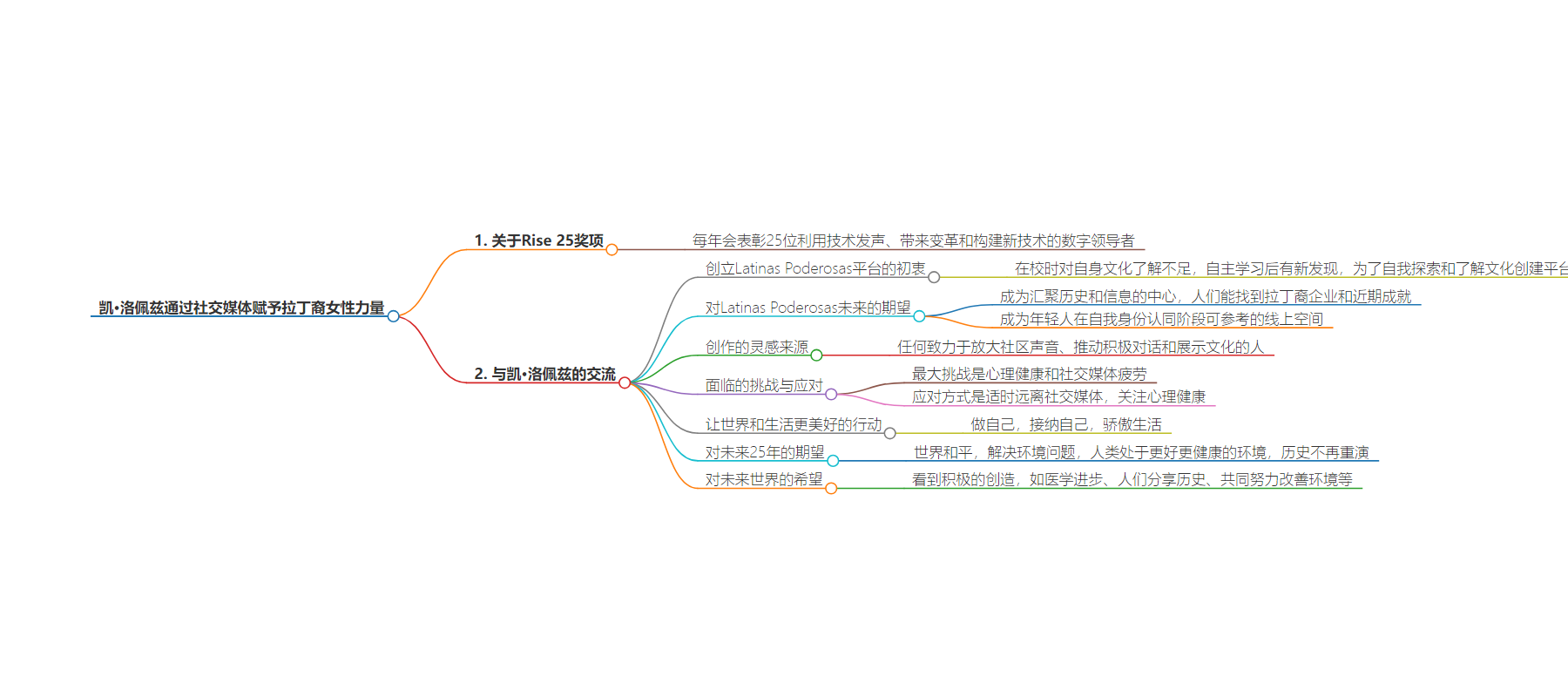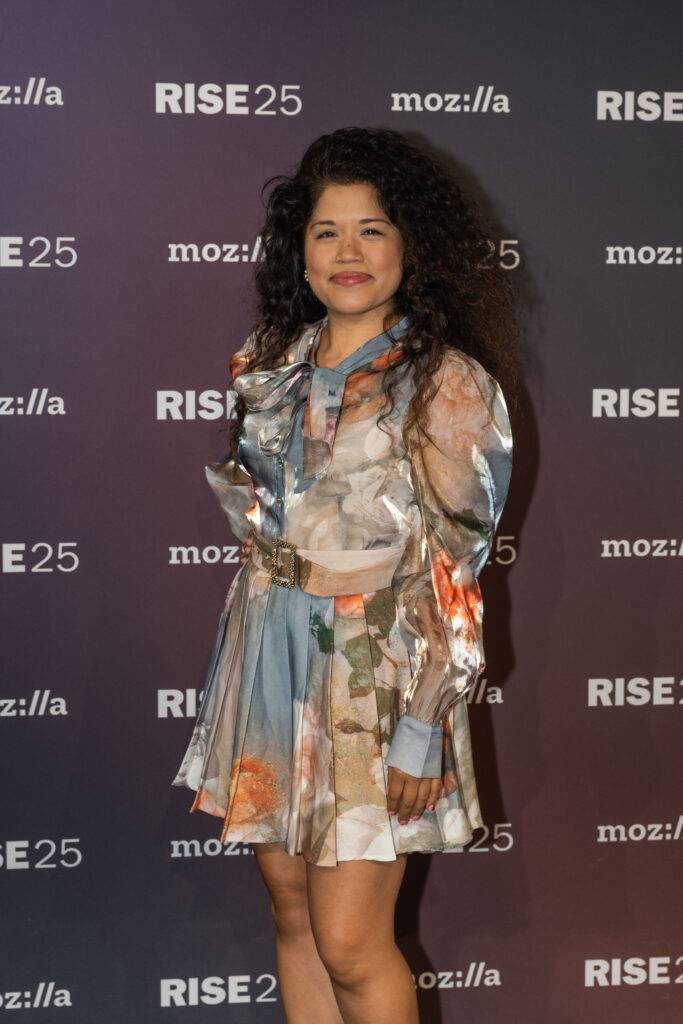包阅导读总结
1. 关键词:Kay Lopez、Latinas Poderosas、文化传承、社交媒体、未来展望
2. 总结:本文主要介绍了 Kay Lopez 致力于通过其平台 Latinas Poderosas 传承拉丁文化,她分享了个人文化学习经历、对平台未来的期望、创作灵感来源,还探讨了面临的挑战如社交媒体带来的疲惫及对未来的展望,包括世界和平与更健康的环境等。
3.
– Kay Lopez 与文化探索:在学校未充分学习自身文化,通过自主研究发现许多被忽视的内容,创建 Latinas Poderosas 以自我学习和分享。
– 平台的未来期望:希望其成为展示拉美女性文化、成就和商业的中心,帮助人们找寻身份认同。
– 创作与灵感:从致力于文化传承和积极对话的创作者中获取灵感,回避负面交流。
– 挑战与应对:认为今年最大挑战是心理健康和社交媒体疲惫,建议适当断开连接关注自身精神状态。
– 行动与未来展望:呼吁做自己,希望未来 25 年世界和平、解决环境问题等。
思维导图:
文章来源:blog.mozilla.org
作者:Aron Yohannes
发布时间:2024/7/1 14:00
语言:英文
总字数:1657字
预计阅读时间:7分钟
评分:81分
标签:互联网文化,Mozilla,倡导,Rise 25,社交媒体
以下为原文内容
本内容来源于用户推荐转载,旨在分享知识与观点,如有侵权请联系删除 联系邮箱 media@ilingban.com
VIDEO
At Mozilla, we knowwe can’t create a better future alone, that is why each year we will be highlighting the work of 25 digital leaders using technology to amplify voices, effect change, and build new technologies globally through ourRise 25 Awards.These storytellers, innovators, activists, advocates. builders and artists are helping make the internet more diverse, ethical, responsible and inclusive.
This week, we chatted with Kay Lopez, a content creator dedicated to empowering Latinas by celebrating their heritage and accomplishments. We talk with Kay about the launch of her platform, Latinas Poderosas, what inspires her work as a creator, navigating social media exhaustion and more.
You mentioned in your video that when going to school, you felt you didn’t learn enough about your own culture. What things did you learn along the way that surprised you?
So growing up in Texas, I feel like a lot of the education was very much focused on obviously American culture, right? The conversation was about pilgrims, Native Americans, colonies, the creation of colonies. The colonization of the United States was very much painted as it was a fun time, a great time, a perfect America, and I fed into it. I believed that was accurate history that I was being taught in school. But when I started to really dig in and watch documentaries on my own, I discovered the number of individuals that helped build America and their own stories. Whether they were inventors, or whether they had impacted the art scene, what we eat today, especially with the dishes — the grains, everything that we consume where it comes from — I just started to feel like that was in the shadows and when I started to learn more on my own about people that came to America and built America, I started to get even more inspired to want to learn more, and really started to share that history on my platform. So the creation of Latinos Poderosas was a lot for myself initially so I could learn about what it meant to be a first-generation American, and learn more about my culture and celebrate what my culture has brought to the U.S. from the perspective of a first-generation, and then along the way, I just felt like every time that I shared another piece of information and history, people started to follow or engage, or share, or get really, really excited. There’s something about learning a tad bit of history that you never knew. You get really prideful of your culture, and you start to share it, and you feel like you’re more connected to it. And you’re prideful. That was kind of my journey of self-discovery and learning, going beyond what I was taught in school and making the time and energy to go out and watch documentaries, go out to libraries, go to check-out books about everything about how the U.S. became to be what it is today.
Where do you hope to see Latinas Poderosas grow in the next few years?
Where I see it going, just going off of what I see on social media and the trends that I’m seeing, I see Latinas Poderosas becoming this like hub for hosting and holding a lot of like history and a platform where people can come and find things like businesses that are Latina-owned, recent moments in history that are being accomplished. I want it to become a hub. And what I’m seeing on social media is this younger generation is so proud to showcase their culture online, and that’s very different from the way that I grew up back in Texas. It was very much like you put your culture behind you, and you just kind of present yourself as an American, and now I’m seeing the reverse of people being very much like, “No, this is what I eat. This is what we eat in our culture. I’m very proud of it. This is the music that we listen to. This is some of the outfits that we wear.” So I see this moment online where people are going to be more proud to kind of share who they are fully and also showcasing their culture. So I hope Latinas Poderosas can be this hub that hosts a lot of that information, and a lot of those moments that people can just refer to whenever they feel like they’re in this moment of trying to figure out their identity of who they are.
I feel like a lot of the conversations that I personally have heard, and from my personal experience, a lot of people when they’re growing up, and they’re in their pre-teens and teens, they’re kind of confused trying to figure out who they are as an individual. And then when they hit their 20s, you wonder, “who really am I?” And it goes back into thinking of who are you? Culturally, your roots. How do you identify and navigate this world? So I hope that when people are at that stage of their lives, when they’re trying to figure out how they can celebrate themselves and who they are fully, they can have a platform, an online space where they can be like, “OK, here’s where I can learn about myself. Here’s where I can learn about and support businesses from my community.” Maybe they don’t want to create their own platform, maybe they don’t want to create their own brand, but they’re like, “how can I support?” So I hope it becomes that type of online space where people can just find it whenever they’re in that moment of wondering who they are, how they can celebrate themselves and learn more about who they are and where they come from.
We’re definitely in a world today where it’s a lot more accepted to embrace your culture, especially in schools.
And now you see people wearing like the traditional patterns or clothing. And it’s very in your face now, and you’re like, “Hey, where was this type of energy when I was in middle school or high school, and you were teasing me?”

Who are some of the other creators you draw inspiration from to continue your work today?
I wouldn’t call out anyone specifically, I would just say again that it’s anyone who’s in the space of culture. I look at anyone who’s trying to amplify the voice of their communities to really showcase and educate, who are really trying to drive positive conversation. I think that’s the number one thing for me. There is a lot of trolling, negative conversations that can affect people’s mental health and very aggressive conversations when it comes to culture, and those are the conversations I tend to shy away from. Only because I really want to focus on how we can move forward progressively as communities of color within the United States. How can we just kind of focus on amplifying the positive and trying to break some noise and create positive impact? Long answer, but it’s just to say it’s really anyone who is trying to make a positive space online while amplifying culture.
What do you think is the biggest challenge we as a whole face in the world this year, on and offline? How do we combat it?
I would say it’s mental health. Social media exhaustion, I hear it so much. I’ve been in the social media space for 12 years. I started on MySpace, creating content for brands, so I’ve been in this space for a very long time. It can become a very overwhelming space with a lot of information. I do believe, despite me being in social media and working for brands on their social and having my own platform, that mental breaks are OK and they should happen. You should be able to walk away from social media. You should be able to walk away from your phone and be like, “Hey, I just need to connect with the real world for a little bit and then come back.” Because the way that it’s affecting people can be very negative. Like having someone step away from their phone or not having a phone on them causes panic in a lot of people, so being able to be OK with disconnecting, I would say, is something that should be a priority for your mental state when it comes to being online and knowing how to set your boundaries for your mental health.
What is one action that you think everyone should take to make the world and our lives a little better?
I feel like the quick answer is just be yourself. Embrace who you are and live proudly every day with that mindset. I think it just makes you a happier person as a whole, but then it also welcomes others to learn.
We started Rise25 to celebrate Mozilla’s 25th anniversary, what do you hope people are celebrating in the next 25 years?
That’s such a heavy question. Truthfully, something that I think about all the time is world peace. That we have solved the environmental issues that we are facing. That as a human species, we’re just in a better, healthier environment. And that history doesn’t repeat itself.
What gives you hope about the future of our world?
What gives me hope, I think, is just seeing what’s being created, whether that’s like advances in medicine, seeing people share history, just all of us working towards a better environment, working towards a better world. It just makes me hope that we are in a more positive existence and a better, safer environment. Despite the negative that is happening in today’s world, I do see that there are those who are really working towards a better tomorrow and I hope that we can see that in the next coming years.
Get Firefox
Get the browser that protects what’s important
